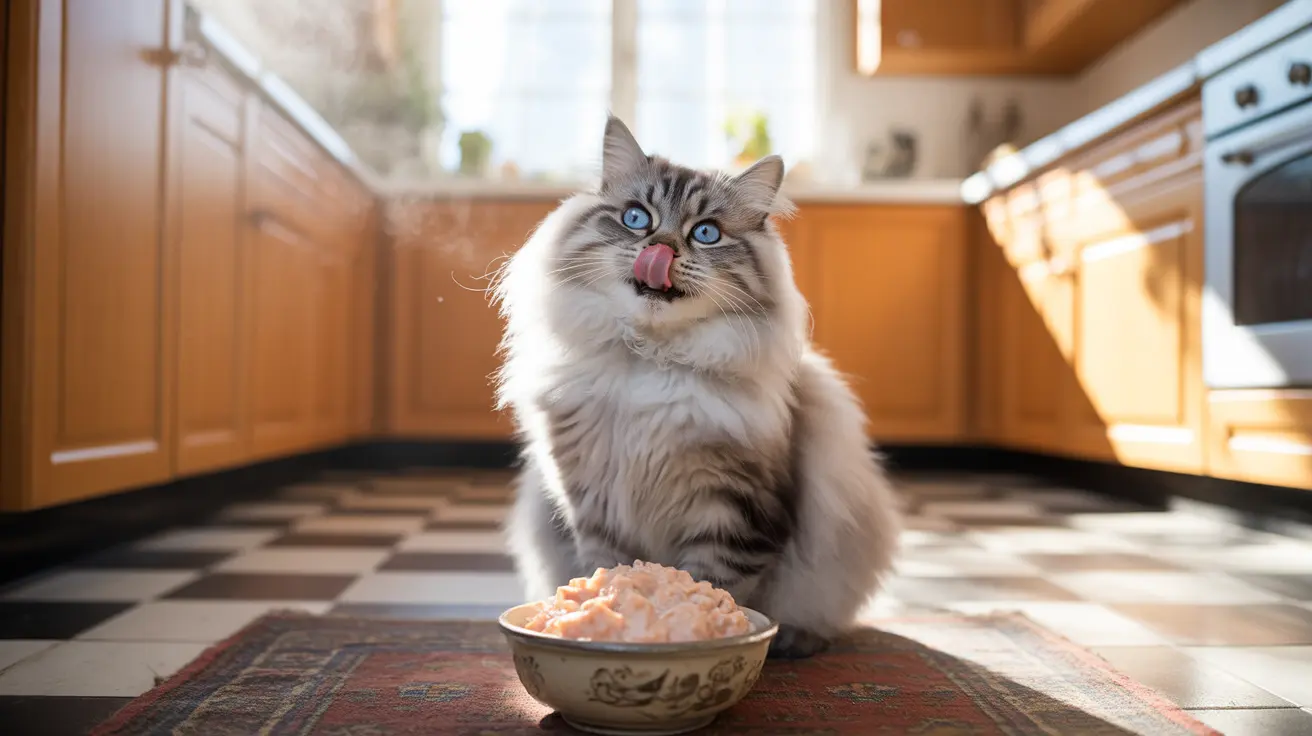If you've noticed your cat keeps licking its lips frequently, you might be wondering whether this behavior is normal or a sign of something more serious. While occasional lip licking is a natural part of feline grooming and eating habits, excessive or unusual lip licking can indicate various health issues or behavioral concerns that deserve attention.
In this comprehensive guide, we'll explore the many reasons behind this common feline behavior, help you distinguish between normal and problematic lip licking, and explain when you should seek veterinary care.
Normal Reasons for Cat Lip Licking
Post-Meal Grooming
Cats naturally lick their lips after eating to clean food residue and maintain proper hygiene. This instinctive behavior helps remove food particles and odors that might attract predators in the wild. If your cat licks its lips shortly after eating, this is typically nothing to worry about.
Anticipatory Behavior
Many cats will lick their lips when they smell food or anticipate mealtime. This is a normal physiological response similar to humans salivating when they smell something delicious. You might notice this behavior when preparing their food or opening treat packages.
Medical Causes for Excessive Lip Licking
Dental and Oral Issues
Dental disease, gingivitis, tooth abscesses, or oral tumors can cause frequent lip licking. Additional signs might include bad breath, drooling, or difficulty eating. Studies show that up to 85% of cats over three years old have some form of dental disease.
Nausea and Digestive Problems
Cats often lick their lips when feeling nauseous or experiencing digestive issues. This can be caused by:
- Hairballs
- Gastrointestinal infections
- Food allergies
- Kidney disease
- Inflammatory bowel disease
Upper Respiratory Issues
Nasal congestion, allergies, or respiratory infections can lead to increased lip licking, especially if your cat is dealing with post-nasal drip or having to breathe through their mouth.
Behavioral and Stress-Related Causes
Anxiety and Stress
Cats may exhibit excessive lip licking when stressed or anxious. Common triggers include:
- Changes in environment
- New pets or family members
- Loud noises
- Travel or moving
- Changes in routine
Compulsive Behavior
In some cases, lip licking can develop into a compulsive behavior, especially if the original trigger (medical or stress-related) isn't addressed. This is more common in certain breeds like Siamese cats.
When to Seek Veterinary Care
Contact your veterinarian if your cat's lip licking is accompanied by:
- Decreased appetite or difficulty eating
- Drooling or bad breath
- Pawing at the mouth
- Visible oral injuries or swelling
- Lethargy or behavior changes
- Vomiting or weight loss
Frequently Asked Questions
Why does my cat keep licking its lips after eating or grooming?
Post-meal lip licking is normally part of your cat's natural grooming routine to clean food residue and maintain hygiene. This behavior is typically nothing to worry about unless it becomes excessive or is accompanied by other symptoms.
What health problems can cause a cat to lick its lips excessively?
Several health issues can cause excessive lip licking, including dental disease, nausea, gastrointestinal problems, respiratory infections, and oral injuries or infections. Any persistent changes in this behavior should be evaluated by a veterinarian.
How can I tell if my cat's lip licking is due to stress or a medical issue?
Look for other behavioral changes or symptoms. Stress-related lip licking often occurs alongside hiding, reduced activity, or changes in eating habits. Medical issues typically present with additional symptoms like drooling, bad breath, or difficulty eating.
When should I take my cat to the vet for frequent lip licking?
Seek veterinary care if the lip licking is excessive, sudden, or accompanied by other symptoms like drooling, pawing at the mouth, decreased appetite, or behavioral changes. Immediate attention is needed if your cat shows signs of choking or respiratory distress.
Could my cat's lip licking be related to nausea or dental pain?
Yes, both nausea and dental pain are common causes of excessive lip licking in cats. Nausea often occurs before vomiting or during digestive issues, while dental pain may be accompanied by drooling, bad breath, or difficulty eating hard food.
Remember that while occasional lip licking is normal, any significant changes in this behavior warrant attention. When in doubt, consult with your veterinarian to ensure your cat's health and well-being.






